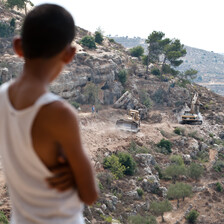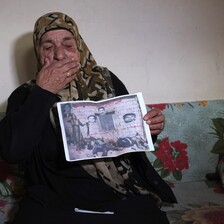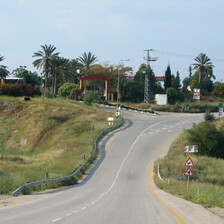The Electronic Intifada 4 October 2010

Right-wing Israelis and Israeli settlers march through occupied East Jerusalem. (Anne Paq/ActiveStills)
As Israel’s self-imposed and largely irrelevant settlement freeze ends, Israeli Prime Minister Benjamin Netanyahu has asked settlers to show “restraint.” It is an interesting choice of adjective, for people who show restraint are the injured and outraged; they are victims who although entitled to a full measure of justice settle for less to maintain good will and harmony. In the context of the West Bank settlers and Israel’s illegal colonization no adjective could be less appropriate. Yet unwittingly it also reveals the mendacity behind Israel’s whole approach to these negotiations.
Settlements — or to describe them accurately, illegal Jewish-only colonies — did not happen by accident; nor do they continue as some sort of unfortunate but unavoidable historical hangover. Rather they are central to Israel’s entire policy with regard to the occupied Palestinian territories.
Centrally planned, funded and protected, the settlements are aimed at achieving strategic goals. What those goals are was revealed as early as the summer of 1967 with the Allon Plan, developed shortly after Israel occupied the West Bank. The plan was developed by and named after Yigal Allon, former general and then minister of labor. It involved Israel annexing and settling large sections of the West Bank, including the Jordan Valley, East Jerusalem and areas around Hebron. Meanwhile, the major Palestinian population centers would be returned to Jordanian control under the terms of a peace agreement. Although the plan was never approved, it has served as the basis for Israeli settlement policies and peace proposals since. Successive Israeli governments have offered their own adjustments to the Allon Plan, including the seizure of the main Palestinian water aquifers in the northern West Bank.
A quick look at the division of the West Bank under the Oslo process into Areas “A,” “B” and “C” shows clearly how in Area C, the area remaining under full Israeli control, this vision of annexation and expropriation has been put into practice. Area C comprises 59 percent of the West Bank but only 4 percent of its Palestinian population — it is the sector containing all of Israel’s settlements. Those unfortunates who live there are subject to all kinds of discriminatory laws and practices.
The UN Office for the Coordination of Humanitarian Affairs states that 96 percent of Palestinian applications for building permits are refused while those few that are approved are restricted to just one percent of the territory. Malnutrition is also a problem with up to 28 percent of herding community children suffering from stunted growth (“Food Security and Nutrition Survey of Herding Communities in Area C,” Joint UNRWA-UNICEF WFP Household Survey, April 2010 [PDF]).
Amnesty International has reported that in the Jordan River Valley, wells dry up because of overuse by the settlements while the Israeli army has prevented Palestinians from even collecting rain water (“The day the bulldozers came,” Amnesty International, 27 October 2009). Meanwhile right next to this deliberate dispossession and impoverishment, the Jewish-only settlements keep their lush lawns, their Jewish-only highways and their subsidized housing.
Appalling as all this is, it is important to reiterate that it is not accidental: this is the planned imposition of a colonial apartheid system aimed at achieving ethnic cleansing. Even during the heyday of the Oslo peace process in the 1990s the number of settlers doubled. In short, Jewish settlement is a policy that is so central to Israel it has never been willing to curtail it, even for the prize of peace.
Yet all this is so unnecessary. The settlements are illegal, they violate international humanitarian law, international human rights law, a 2004 ruling by the International Court of Justice in The Hague, numerous UN Security Council, Human Rights Council and General Assembly resolutions, and the oft-cited Roadmap of the “Quartet” (i.e., the US, EU, UN, and Russia).
Yet all this can be resolved; all that needs happen is that Israel be held to the same standards of law as every other state in the world. In this context then, it is quite ludicrous for Netanyahu to call upon the settlers he encourages, funds and protects to show “restraint.” Restraint rather is what the Palestinians have shown waiting for the international community to wake up to Israel’s fundamental mendacity and actually get around to implementing the international legal standards and laws they have established.
Richard Irvine teaches a course at Queen’s University Belfast entitled “The Battle for Palestine” which explores the entire history of the conflict. Irvine has also worked voluntarily in Palestinian refugee camps in Lebanon and taken part in olive planting and harvesting in the West Bank.





